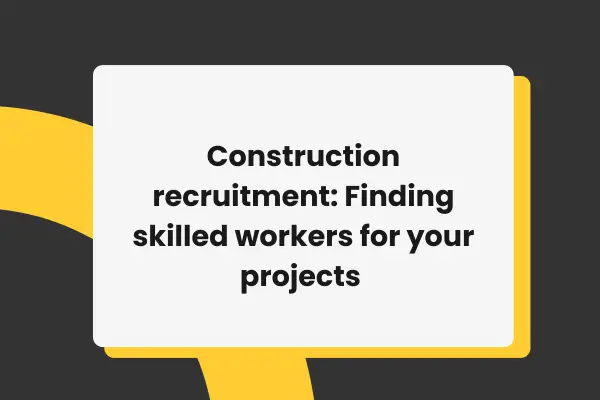
Theconstruction industry is under constant pressure to deliver on ambitious infrastructure, commercial, and residential projects. From site supervisors and project managers to skilled trades and equipment operators, every role requires precision, safety awareness, and reliability.
Labour shortages, competition for skilled workers, and shifting expectations around job security and career progression mean recruitment is no longer just about filling vacancies. It is now a strategic business priority that directly affects timelines, safety, quality, and profitability.
The construction talent shortage
One of the most significant issues facing construction is the shortage of qualified workers. As experienced professionals retire, fewer new entrants are stepping in to replace them. Apprenticeship pipelines have weakened, and misconceptions about limited career progression continue to discourage young people.
Roles that require specialist skills are particularly hard to fill. Site managers, estimators, surveyors, engineers, and qualified trades such as carpenters, electricians, and bricklayers are consistently in high demand. When positions remain vacant, projects risk delays and costs increase as existing teams are stretched thin.
Seasonal activity, economic cycles, and regulatory requirements add further pressure. Sudden increases in building activity can leave employers scrambling for labour, while visa restrictions may limit access to international talent. The result is a highly competitive hiring landscape where employers must be proactive and strategic.
Developing a targeted hiring strategy
Generic job adverts and outdated processes will not attract the right candidates in today’s market. A targeted approach begins with clear job descriptions that highlight essential qualifications, certifications, and on-site demands. Candidates should be able to quickly assess whether they are suitable before applying, saving time for both sides.
Recruitment processes must also be streamlined. Delays in communication can cause employers to lose candidates to competitors. Structured workflows, timely updates, and transparency around the steps involved create a better experience and reinforce your reputation as an organised employer.
Involving operational leaders in recruitment decisions is another effective step. Site managers and team leads can provide valuable input on technical requirements and help assess cultural fit, reducing the risk of mismatched hires.
The role of specialist recruitment agencies
Construction recruitment agencies bring expertise that goes beyond advertising roles. They understand industry regulations, timelines, and the challenges of hiring for both temporary and permanent positions. By accessing their pre-screened networks, employers can quickly fill roles that might otherwise remain vacant for months.
A strong agency partner takes the time to understand your company’s projects, culture, and workforce needs. This enables them to recommend candidates who are not only technically competent but also aligned with your way of working. Agencies are also key to reaching passive candidates, experienced professionals who are not actively applying but are open to new opportunities if approached discreetly.
Clear communication is vital to getting the most out of an agency partnership. Providing detailed feedback on CVs, interviews, and role requirements helps refine candidate shortlists and ensures time is not wasted on unsuitable matches
Accessing passive candidates
Some of the most skilled and reliable professionals are already employed and may not be scanning job boards. To reach this group, employers must go beyond traditional advertising. Recruitment consultants with strong networks are often best placed to approach passive candidates with opportunities tailored to their career motivations.
Building your employer brand also helps attract this talent. Companies known for strong safety records, professional site management, and clear career pathways stand out in the market. Sharing employee stories, project successes, and training initiatives on your website or LinkedIn reinforces this reputation.
Referral schemes can further extend your reach. Employees who enjoy working with your company are likely to recommend trusted contacts, often leading to higher-quality hires.
Retention through smarter hiring
Recruitment success is about retaining the right people. Hiring candidates who align with your values, safety standards, and communication style helps create stable teams that perform consistently.
Assessing cultural fit during interviews is as important as verifying technical skills. Asking about collaboration, problem-solving, and handling challenges provides insight into how a candidate will integrate with existing crews.
Once hired, onboarding plays a crucial role in retention. Clear inductions, safety training, and regular check-ins during the first few weeks set expectations and make new employees feel supported. Ongoing development, from apprenticeships to leadership training, demonstrates a commitment to employee growth and encourages loyalty.
Health and safety as a recruitment priority
Health and safety are central to construction, and your hiring practices should reflect this. Candidates must hold relevant certifications and demonstrate a clear understanding of safety procedures. Interviews should explore how they have handled risks or contributed to maintaining compliance on previous sites.
Promoting your commitment to safety also strengthens your employer brand. Publicising initiatives and achievements shows prospective employees that their well-being is a priority. This reassures both experienced professionals and younger entrants who value responsible employers.
Attracting apprentices and young talent
To build a sustainable workforce, construction companies must invest in the next generation. Apprenticeships and vocational training are proven ways to attract young workers and give them the skills to thrive.
Engaging with schools, colleges, and training centres introduces students to construction careers early on. Offering placements, site visits, and mentorship programmes helps demonstrate the variety of opportunities available.
To appeal to younger talent, employers should highlight career progression, modern technologies used on projects, and the ability to move into supervisory or management positions over time. Showcasing success stories from young employees on digital platforms reinforces this message.
Leveraging technology in recruitment
Technology is reshaping recruitment processes across the industry. Applicant tracking systems streamline applications and ensure no candidates are overlooked. Video interviews save time, enable flexibility, and make it easier to involve multiple stakeholders in decision-making.
Digital onboarding platforms allow new hires to access training materials and company policies before their first day, speeding up integration on-site. Meanwhile, analytics can track hiring trends and highlight areas where processes can improve, such as time-to-hire or candidate drop-off points.
Adopting these tools improves efficiency, reduces administrative pressure, and helps companies compete for talent more effectively.
Building a diverse workforce
Diversity is increasingly important in construction. Bringing in talent from a wide range of backgrounds enhances innovation, problem-solving, and collaboration on projects. Employers can expand their talent pool by actively reaching out to underrepresented groups, from women and veterans to individuals with disabilities.
Practical steps include reviewing job descriptions for inclusive language, standardising interview processes, and providing training to reduce unconscious bias. Building partnerships with community groups and industry organisations also widens access to diverse candidates.
An inclusive workplace culture is just as important as recruitment. Respect, equal opportunities, and supportive management ensure diverse hires stay engaged and progress within the company.
Recruiting skilled professionals is one of the most pressing challenges facing the construction industry. Companies that succeed will be those that adopt targeted hiring strategies, use specialist recruitment partners, and proactively engage both active and passive candidates.
Retention is equally critical. Employers who prioritise cultural fit, safety, training, and career progression create stable teams that deliver safer, more efficient projects. By leveraging technology, investing in young talent, and promoting diversity, construction firms can build resilient workforces equipped for today’s demands and tomorrow’s growth.
For tailored recruitment advice, partnering with a construction-focused agency such as Mackinnon Bruce International provides access to market expertise, passive candidate networks, and industry insights to help you secure the best candidates for your business.




